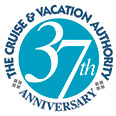Hurricane Season Cruising
In light of 2005's disastrous hurricane season, summer and fall cruise fares in the Caribbean can often be found for a song. Discounts abound, particularly in the peak period between mid-August and early October. But folks, remembering that storms started as early as June and continued into December, are also a little leery of shoulder season.
Last year was mild in comparison; there were fewer storms than expected and the season ended without a single hurricane striking the United States. Still, "better safe than sorry" was the motto for many ports of call and cruise lines, and sailings in the Caribbean as well as the Mexican Riviera were impacted. And 2007 is expected to be above average.
So, is it worth the risk to plan a Caribbean cruise vacation (not to mention voyages to Bermuda and even Canada/New England) during hurricane season? Absolutely, with one major caveat: to quote a cliche, prepare for the worst -- and hope for the best. The thing to bear in mind is that statistically speaking, the chances that your particular voyage is going to be affected by a hurricane are very slim. But it is a possibility, and it's important to approach the cruise with the right attitude.
Cruise schedules and itineraries may well be impacted by storms, anticipated and otherwise, but there's not much of a chance you'll be put in harm's way. These days, cruise ships are outfitted with enough solid engineering and satellite equipment to follow the paths of storms (and head elsewhere). Cruise lines such as Royal Caribbean and Celebrity, have established "situation room" setups -- which enable staffers to monitor storms and respond to changing circumstances.
Key Tip - This is not the time to make a visit to one particular (scheduled) port a crucial element of the holiday (planning a wedding in St. Thomas or a family reunion in St. Maarten, for instance). Itineraries can be disrupted by even the mere threat of a storm.
Be flexible, knowing you may have trouble getting to an airport in south Florida or in San Juan (where many, though not all, Caribbean-bound cruises depart).
And buy insurance, whether through the cruise line or through an independent provider; make sure the policy covers disruption in case of weather-related events.
The Season - Technically, hurricane season runs from June 1 through November 30, and although hurricanes are generally unpredictable, conventional wisdom has dictated that peak season varies by geography (though this turned out to be anything but true in 2005). In the Eastern Caribbean and the east coast of the U.S., the busiest time of the season tends to occur in the mid-August to mid-September time frame. In the Western Caribbean, it runs later, picking up in mid-September and stretching into early November. Early- and late-season hurricanes (June, mid- to late-November) are rare but not unprecedented.
An "average" hurricane season means we can expect 8 to 11 tropical storms; of these 5 to 7 could develop into full-fledged hurricanes. Note, however, that not all hurricanes strike land.
How Safe Are Cruise Ships During Hurricanes? - Most likely you'll never need to know. That's because cruise line strategy -- across the board -- is to avoid rather than confront a storm. Cruise lines have been operating in the Caribbean for years and have, by virtue of experience, specific hurricane/tropical storm emergency response plans in effect. These cover everything from designating a bridge officer as the weather monitor during the season, to outfitting ships with state-of-the-art satellites, to backing up onboard efforts with expanded staff at headquarters.
The trickiest situation for cruise lines whose ships' scheduled ports of call are threatened is finding alternate places to dock or anchor (those ports not already booked up with regular cruise visitors, not to mention other ships looking for a quiet port in a storm). Most common is that cruise lines whose Eastern Caribbean itinerary appears to be in flux will simply switch over to a Western Caribbean port schedule (and vice versa). Can't find a port? The schedule may include a couple of extra sea days (in calmer waters, naturally).
Do you get a refund for missed ports? Alas, no. The fine print in your cruise contract, also known as your ticket, gives lines the right to substitute ports if and when they feel like it.
Even Ships Outrunning a Storm Can Encounter Rough Waters. - When the threat of a storm occurs, cruise ships can "outrun" them -- storms tend to move at about 8 to 10 knots, while ships can attain speeds of up to 22 knots and beyond.
While increasingly sophisticated technology and mechanics can help ships to evade storms, they can't avoid them entirely -- and you may run into rougher-than-usual waters. You can even experience storm remnants in far away places, such as on one of the seasonal north Atlantic repositioning cruises coming out of Europe (big hint: ever wondered where hurricanes go to die? You guessed it, the north Atlantic). While they may be tropical storms or even lesser swirlings by the time they reach Iceland, the waters can still be rough. Be prepared -- even the stalwart should pack their favorite seasickness remedy.
Can't Get to the Ship? - Sometimes hurricane-related problems don't have anything to do with the ship, and everything to do with conditions at the port of embarkation. As we said before, plan ahead. This is a good time of year to build a day or two into your vacation. Aim to arrive in port a couple of days early in case difficulties arise. Prepare for the possibility -- and it happens -- that you might actually arrive home a day or two late. And bottom line: If you're having trouble getting into your port of embarkation make sure you contact the cruise line (carry their toll-free emergency number in your wallet). Most will do everything possible, even if they are not obligated, to help you get to the ship, but there's no guarantee.
Canceled Cruises - Rare, extremely rare. For the aforementioned reasons, cruise lines will simply deviate itineraries. If a cruise is actually canceled you will, obviously, get a refund. You might also receive a discount on a future cruise. Pretty much the only thing that gets cruises canceled outright (and not even regularly) is when a storm is aiming for major ports of embarkation, such as Ft. Lauderdale's Port Everglades or Miami.
Storms on the West Coast ... and Beyond - The East Pacific hurricane season is oft-overlooked because there are simply more people cruising the Caribbean than, say, the Mexican Riviera. However, as we saw last year, the western coast of Mexico is also subject to hurricanes and is monitored in just the same manner by weather experts and cruise lines; last year's Category Two John barely spared Cabo San Lucas and other cruise ports such as Acapulco and Puntarenas have suffered more serious storm damage in the past.
Australia/New Zealand and Hawaii deal with cyclones (same concept) -- and the southern hemisphere's seasonal equivalent is just the opposite of the waters up north (their season peaks in March and April).
Bottom Line? - Start monitoring tropical storm conditions a week before you leave by watching the Weather Channel (or just click on to its Web site at www.weather.com). Be proactive if your cruise seems to be lying in the path of a storm by contacting your travel agent -- or the cruise line directly -- in case contingency plans are necessary.
--by Carolyn Spencer Brown
Reprinted from Cruise Critic

With each issue of Ultimate Experiences Online, you’ll enjoy a collection of articles, slideshows and videos that we will inspire you to make your travel dreams a reality.

To help you discover ways to explore the world, we're pleased to share our The Travel Magazine Online.
 Save money and escape the crowds. Hot Deals and multi-port packages. Savings of up to 50%!
Save money and escape the crowds. Hot Deals and multi-port packages. Savings of up to 50%!

Our free app that allows you to carry all of the destination information you need while traveling, right in your pocket!

We recommend optional travel insurance that protects you in the event of having to cancel your trip avoiding travel vendor cancellation policies and more!





